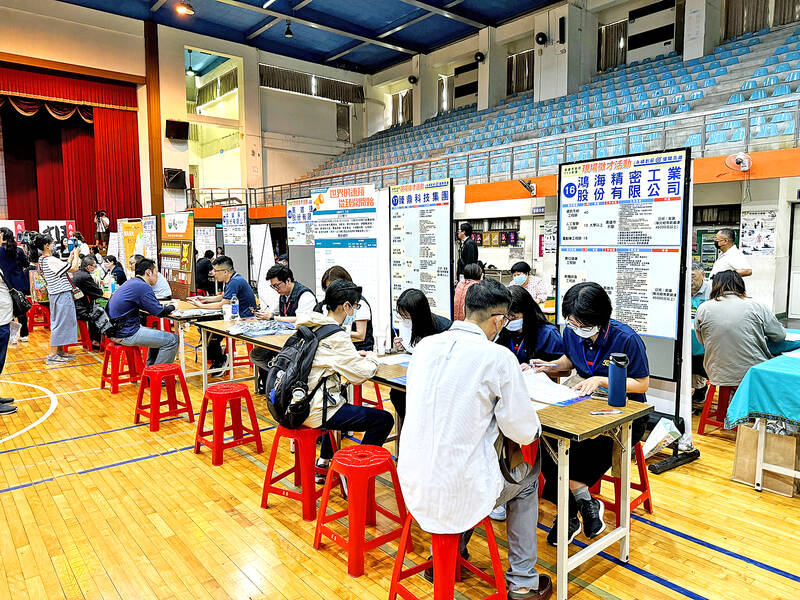Taiwanese workers earned an average of NT$47,000 per month this year, but 40 percent are struggling financially and 18 percent plan to switch jobs within 12 months, two separate surveys showed yesterday.
The amount equals a 5.4 percent increase from a year earlier to a decade high, 104 Job Bank (104人力銀行) said.
The government is due to review the nation’s minimum wages.

Photo: Hsu Li-chuan, Taipei Times
Employees at computer and consumer electronics manufacturers reported the highest average monthly wage of NT$60,000 a month, followed by semiconductor firms at NT$59,000, and vendors of shoe and textile products, along with software and Internet businesses at NT$55,000, 104 Job Bank said.
Tech firms and financial institutes offered higher monthly wages than others, while 40 of 63 sectors offered wages below the average, it said.
Monthly wages for employees at social welfare companies was NT$38,000, while wedding studios, hair salons and property managers paid NT$39,000 to NT$40,000, it said.
Average monthly wages at restaurants, retailers, hotels and recreational facilities also underperformed at about NT$43,000, it said.
The average salary increased NT$1,454 after inflation adjustment, it said.
However, the highest-paying jobs offered 57 percent higher salary than the lowest-paying jobs, it said.
The findings pose challenges for employers seeking to recruit talent, the job bank said, as Taiwan’s economic recovery is gaining traction and labor shortages have exceeded 1 million for 16 consecutive months.
The data also help explain why most Taiwanese workers are overwhelmed with inflation and do not feel the benefits of economic growth, it said.
A separate survey by consultancy firm PricewaterhouseCoopers Taiwan showed that 57 percent of employees in Taiwan had surplus money after paying their bills, while 40 percent were having financial difficulties.
A total of 33 percent of employees said their job became more challenging last year and their workload had significantly increased, the advisory firm said, adding that 17 percent said their workload was unbearable.
Eighteen percent of workers were considering changing jobs within 12 months and 51 percent planned to learn new skills, the survey showed.
Ninety percent of workers believed that generative artificial intelligence would enhance their working efficiency and 36 percent were looking at better pay because of the new technology, the survey said.

MULTIFACETED: A task force has analyzed possible scenarios and created responses to assist domestic industries in dealing with US tariffs, the economics minister said The Executive Yuan is tomorrow to announce countermeasures to US President Donald Trump’s planned reciprocal tariffs, although the details of the plan would not be made public until Monday next week, Minister of Economic Affairs J.W. Kuo (郭智輝) said yesterday. The Cabinet established an economic and trade task force in November last year to deal with US trade and tariff related issues, Kuo told reporters outside the legislature in Taipei. The task force has been analyzing and evaluating all kinds of scenarios to identify suitable responses and determine how best to assist domestic industries in managing the effects of Trump’s tariffs, he

TIGHT-LIPPED: UMC said it had no merger plans at the moment, after Nikkei Asia reported that the firm and GlobalFoundries were considering restarting merger talks United Microelectronics Corp (UMC, 聯電), the world’s No. 4 contract chipmaker, yesterday launched a new US$5 billion 12-inch chip factory in Singapore as part of its latest effort to diversify its manufacturing footprint amid growing geopolitical risks. The new factory, adjacent to UMC’s existing Singapore fab in the Pasir Res Wafer Fab Park, is scheduled to enter volume production next year, utilizing mature 22-nanometer and 28-nanometer process technologies, UMC said in a statement. The company plans to invest US$5 billion during the first phase of the new fab, which would have an installed capacity of 30,000 12-inch wafers per month, it said. The

Taiwan’s official purchasing managers’ index (PMI) last month rose 0.2 percentage points to 54.2, in a second consecutive month of expansion, thanks to front-loading demand intended to avoid potential US tariff hikes, the Chung-Hua Institution for Economic Research (CIER, 中華經濟研究院) said yesterday. While short-term demand appeared robust, uncertainties rose due to US President Donald Trump’s unpredictable trade policy, CIER president Lien Hsien-ming (連賢明) told a news conference in Taipei. Taiwan’s economy this year would be characterized by high-level fluctuations and the volatility would be wilder than most expect, Lien said Demand for electronics, particularly semiconductors, continues to benefit from US technology giants’ effort

‘SWASTICAR’: Tesla CEO Elon Musk’s close association with Donald Trump has prompted opponents to brand him a ‘Nazi’ and resulted in a dramatic drop in sales Demonstrators descended on Tesla Inc dealerships across the US, and in Europe and Canada on Saturday to protest company chief Elon Musk, who has amassed extraordinary power as a top adviser to US President Donald Trump. Waving signs with messages such as “Musk is stealing our money” and “Reclaim our country,” the protests largely took place peacefully following fiery episodes of vandalism on Tesla vehicles, dealerships and other facilities in recent weeks that US officials have denounced as terrorism. Hundreds rallied on Saturday outside the Tesla dealership in Manhattan. Some blasted Musk, the world’s richest man, while others demanded the shuttering of his